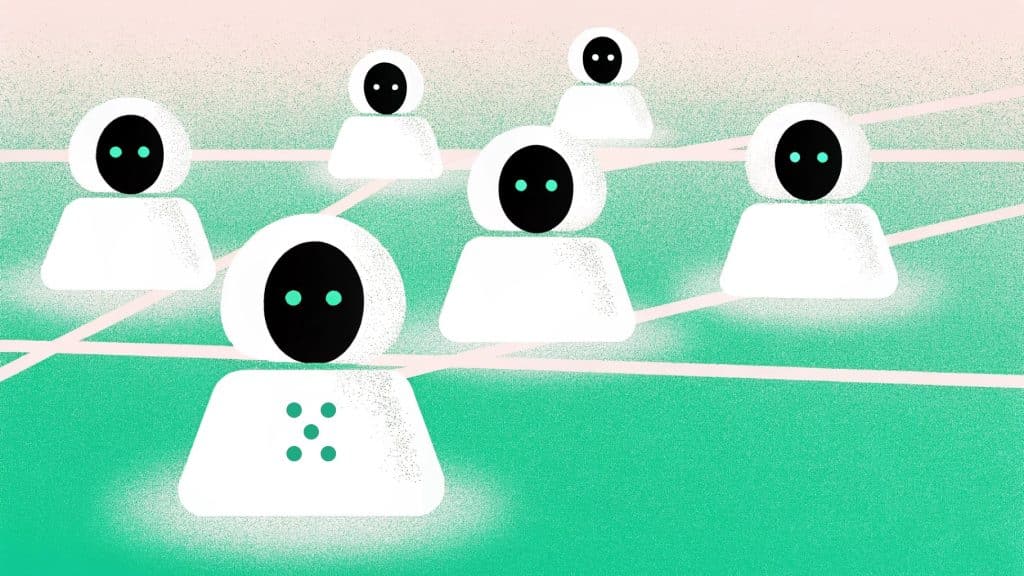You’ve probably used an AI agent without even realizing it.
Ordered food through a chatbot? That’s an AI agent.
Got a playlist recommendation on Spotify? Another one.
Used Google Maps for a faster route? Same thing.
These agents quietly work in the background, helping you make decisions or complete tasks without much fuss.
But not all AI agents do the same thing. Some follow fixed rules while others learn and adapt as they go. In this article, I’ll walk you through 15 AI agent examples that are active in 2025.
I’ll explain what type of agent each one is, where it’s used, and how it works—all in simple words. Whether you’re just curious or trying to figure out how AI fits into your work, this should give you a clear picture without the tech jargon.
What Are the Different Types of AI Agents in 2025?
AI agents aren’t one-size-fits-all–you’ll find different types depending on how AI agents work and what they’re built for. Here’s a breakdown of the main types of AI agents you’ll come across in 2025, with examples to help you understand how each one works.
1. Simple Reflex Agents
These agents follow basic “if this, then that” logic. They only react to the current situation without thinking about what happened before or what might happen next. Everything is based on fixed rules.
You’ll see this type of agent in things like motion-sensor lights or basic thermostats. For example, a thermostat that turns on heating when the room drops below a certain temperature and turns it off when it goes above—that’s a simple reflex agent. It doesn’t learn your routine or adjust based on the weather. It just follows one rule based on what it senses.
2. Model-Based Reflex Agents
Unlike simple reflex agents, these ones build a small internal model of the world around them. This helps them make better decisions even if they can’t see everything directly. They track how things typically behave and use that information to act.
Self-driving cars use this type of AI. They take sensor inputs and build a real-time map of their surroundings, like where other vehicles are, where pedestrians are crossing, and what the traffic lights are doing. Even if the view is partly blocked, the car predicts what’s happening based on its model.
3. Goal-Based Agents
These agents don’t just react; they plan. They evaluate different actions based on whether those actions move them closer to a goal. The goal is clearly defined, and the agent uses logic to figure out the best way to reach it.
Think about a personal fitness app that asks for your weight goal, then creates a daily workout and diet plan. That app is working as a goal-based agent. It takes your goal and figures out what steps will help you get there, adjusting the plan if needed.
4. Utility-Based Agents
Sometimes reaching the goal isn’t enough. Utility-based agents go a step further. They look at multiple possible outcomes and pick the one with the best overall benefit. These agents use a “utility function,” which is just a way to score how useful or desirable each option is.
For instance, a smart home energy system might try to keep you comfortable, save money, and reduce power usage all at once. It won’t just aim for a fixed temperature. Instead, it’ll consider the time of day, your habits, and electricity rates to decide the most balanced setting.
5. Learning Agents
Learning agents improve through experience. They don’t rely only on rules or goals—they adapt based on what works and what doesn’t. Over time, their performance gets better without needing new instructions.
A good example is your email’s spam filter. When you mark a message as spam, the system learns from that choice. It updates its understanding of what spam looks like, and future emails that match the pattern are filtered more accurately. That’s a learning agent in action.
6. Multi-Agent Systems (MAS)
This setup involves several AI agents working in the same environment. They may work independently or coordinate with each other. The goal could be shared or individual, but the key is that multiple agents are active at once.
In warehouses, you’ll find robots that pick, pack, and move items. Each robot is an agent with its own job, but they also avoid crashing into each other and might even adjust their speed based on where others are. Together, they keep the warehouse running smoothly.
15 Examples & Real-Life Applications of AI Agents in 2025
In 2025, AI agents are being used in a variety of ways across different industries, transforming operations and enhancing customer experiences. Whether you’re running a business, managing a team, or simply looking for ways to improve efficiency, AI agents can help.
Here a quick overview at the 15 AI agents being used today:
| Use Case | Description |
| Content Production for Marketing Teams | Streamlines content creation, generates drafts, and enables collaborative workflows for marketing teams. |
| Customer Support Agent | Automates customer support by drafting responses, analyzing past interactions, and personalizing replies. |
| Contract Review Assistant | Helps legal teams scan contracts for risks, missing clauses, and discrepancies—speeding up the review process. |
| Sales Follow-Up Automation | Generates personalized follow-up emails based on CRM data, saving time and improving lead nurturing. |
| Meeting Summary Agent | Summarizes key points and decisions from meetings automatically, ideal for remote or hybrid teams. |
| Automated Financial Forecasting | Predicts revenue, expenses, and cash flow using historical and real-time financial data. |
| Faster Deal Closures | Accelerates M&A workflows like due diligence and modeling, enabling faster and more accurate deal closures. |
| Efficient Software Development | Automates coding, debugging, and collaboration tasks to boost developer productivity. |
| Stronger Data Governance | Classifies and monitors sensitive data to support regulatory compliance and prevent breaches. |
| Personalized Marketing Campaigns | Creates targeted, data-driven campaigns using customer behavior and purchase history. |
| Predictive Maintenance | Detects early signs of machinery failure using sensor data, reducing downtime and repair costs. |
| Supply Chain Management | Forecasts demand, manages inventory, and adjusts to disruptions for smooth logistics operations. |
| Fraud Detection | Analyzes transactional patterns to flag or block suspicious activities in real-time. |
| Employee Training | Designs adaptive, personalized learning paths based on employee skills and performance. |
| Customer Support | Offers round-the-clock assistance via chat, email, and social platforms using NLP and automation. |
#1: Content Production for Marketing Teams
AI agents can significantly boost productivity for marketing teams by streamlining content creation processes. Instead of starting from scratch each time, AI tools can help with generating initial drafts, suggesting improvements, and even handling repetitive tasks like copywriting and social media posts.
For example, The Crew, a creative agency based in Stuttgart, implemented Team-GPT to centralize their content creation process. Before Team-GPT, their workflows were fragmented, with prompts stored separately, making collaboration difficult.
After introducing the tool, they saw improvements across the board:
- Time savings of 10–60% in content generation tasks.
- Faster idea generation by reusing prompts across multiple projects.
- Improved collaboration, as shared chat histories allowed the entire team to build on each other’s insights.
#2: Customer Support Drafting Agent
AI agents can help customer support teams handle high volumes of inquiries more efficiently. By integrating AI with your help center, the agent can automatically suggest responses based on past queries, reducing the time spent crafting each message.
The AI will personalize responses by pulling in relevant customer data and previous interactions. This not only speeds up response times but also maintains consistency across the team’s communications.
#3: Contract Review Assistant
AI agents can be particularly useful for small legal teams or businesses that regularly review contracts. The agent scans through contracts to identify any missing clauses, discrepancies, or terms that might pose a risk. This speeds up the review process and reduces the chances of missing important details.
While it doesn’t replace legal expertise, it makes the first pass through contracts more efficient, allowing legal teams to focus on more complex issues.
Legal teams can use Team-GPT’s to:
- Analyze and summarize contracts and legal documents for key clauses.
- Search case law and statutes for relevant precedents.
- Draft legal memos and briefs based on specific case information.
- Analyze legislative documents for potential risks.

#4: Sales Follow-Up Automation
For sales teams, AI can help generate personalized follow-up emails after leads fill out contact forms or engage with your site. The AI reads through your CRM (customer database), identifies key interests, and drafts a custom message for each lead.
Rather than writing each email manually, sales teams can review and quickly send them, keeping responses timely and personalized without spending too much time on each.
With a tool like Team-GPT, sales teams can transform your lead generation and sales processes with the assistance of AI by uploading files directly in Team-GPT, analyzing them, and drawing insights.
Create custom sales prompts with industry specifics, ensuring effective outreach across various niches.

#5: Meeting Summary Agent
AI agents integrated with your meeting platforms can automatically generate meeting summaries. This tool listens to your meetings, highlights key points, and sends a summary with action items and decisions made during the call.
This is particularly useful for remote and hybrid teams where meetings are frequent. It helps everyone stay on the same page without the need for manual note-taking or detailed recaps.
#6: Automated Financial Forecasting
AI agents can help small businesses manage their finances more effectively by providing accurate, data-driven financial forecasts. By analyzing past financial data and market trends, AI can predict revenue, expenses, and cash flow, offering valuable insights into future financial performance.
This forecasting can also identify potential risks, helping businesses make more informed decisions. Whether it’s predicting seasonal sales drops or identifying potential cost-saving opportunities, AI keeps businesses prepared for what lies ahead.
#7: Faster Deal Closures
AI agents can greatly accelerate the deal closure process, particularly in industries like M&A (mergers and acquisitions). By automating tedious tasks like due diligence, contract analysis, and financial modeling, AI agents help advisory firms close deals faster and more accurately.
For example, Nextoria, a London-based M&A advisory firm, was able to accelerate deal closures by 35% using Team-GPT, an AI-powered platform designed for M&A processes. Team-GPT streamlined their due diligence process, improved financial modeling, and supported negotiations, enabling Nextoria to close deals more quickly and with higher accuracy.
#8: Efficient Software Development
AI agents are revolutionizing the software development process by automating repetitive tasks, improving coding efficiency, and enhancing collaboration across development teams.
With AI integration, businesses can now leverage advanced models that streamline tasks such as debugging, coding suggestions, and real-time communication. This allows developers to focus on more complex problems, significantly boosting productivity.
For instance, Camplight, a digital venture-building platform, integrated Team-GPT across its organization, resulting in a 25% increase in coding efficiency. By employing multiple AI models tailored to specific project needs, the company saw a 30% reduction in debugging time and a 40% shorter product development cycle.
#9: Stronger Data Governance
AI agents play a key role in improving data governance by automating the classification and organization of sensitive information. These agents ensure that your business complies with data protection regulations, such as GDPR (General Data Protection Regulation) or CCPA (California Consumer Privacy Act).
These agents can monitor and flag sensitive data, reducing the risk of data breaches and ensuring that your team follows proper data handling procedures.
For example, Enlighten Designs, a leader in software development and systems integration, adopted Team-GPT for centralized AI access across their organization. This approach allowed them to provide secure, cost-effective, and easily manageable access to multiple AI models.
#10: Personalized Marketing Campaigns
AI agents are revolutionizing how businesses approach marketing by offering hyper-personalized campaigns. By analyzing vast amounts of customer data—such as past purchase history, website interactions, and even social media activity—AI can help businesses create highly targeted content and offers.
For example, AI can suggest personalized product recommendations to customers based on their browsing behavior or tailor promotional messages to align with individual preferences. This targeted approach increases the likelihood of conversions, enhances customer loyalty, and boosts the effectiveness of marketing efforts.
#11: Predictive Maintenance
AI agents in industries like manufacturing, logistics, and transportation are using real-time data from sensors embedded in machinery to predict failures before they occur. These AI-powered systems analyze patterns in equipment performance, vibration, temperature, and other indicators to identify early signs of wear and tear.
For instance, AI can predict when a machine part is likely to fail based on data trends, allowing companies to schedule maintenance at the most cost-effective time, preventing unplanned downtime. This approach not only saves money by avoiding expensive repairs but also extends the lifespan of equipment, ensuring smoother operations.
#12: Supply Chain Management
AI agents in supply chain management are streamlining operations by predicting demand fluctuations, optimizing inventory levels, and ensuring timely deliveries. By analyzing data such as historical sales, market trends, and even weather patterns, AI can predict shifts in demand and adjust inventory levels accordingly.
For example, AI can forecast a spike in demand for a particular product during the holiday season and ensure the necessary stock is available. AI can also anticipate supply chain disruptions—like delays caused by weather or geopolitical factors—and suggest alternative routes or suppliers, ensuring businesses can continue meeting customer demands without delays.
#13: Fraud Detection
In sectors like banking, e-commerce, and insurance, AI agents are playing a crucial role in identifying fraudulent activities in real time. By continuously analyzing transactional data and customer behaviors, AI agents can detect unusual patterns that may indicate fraud, such as sudden spikes in transaction volume, changes in buying behavior, or atypical payment methods.
For example, if an AI agent identifies a transaction that deviates from the usual spending pattern—like an unusually large purchase from an overseas account—it can flag it for further review or instantly block the transaction. This proactive approach helps businesses prevent financial losses and protect both their assets and their customers.
#14: Employee Training
Using machine learning algorithms, AI agents can analyze an employee’s existing skill set, identify gaps in knowledge, and design customized learning paths. These AI systems can provide interactive training modules, quizzes, and assessments that adapt to each learner’s pace and progress.
For example, AI can recommend specific courses or training materials based on an employee’s job role and performance. By focusing on individual learning needs, AI ensures faster onboarding for new employees and continuous professional development for existing ones.
#15: Customer Support
AI agents are significantly enhancing customer service operations by providing 24/7 support across a variety of communication channels, including chat, email, and social media. Using advanced natural language processing (NLP), these AI agents can understand and respond to customer inquiries instantly.
For example, they can guide customers through troubleshooting steps, answer frequently asked questions, and offer personalized product recommendations based on previous interactions. By automating routine tasks, AI enables customer service teams to focus on more complex issues, improving overall service efficiency.
Next Steps: Adopt AI Alongside Your Team with Team-GPT
If you’re exploring practical ways to use AI agents across your business in 2025, Team-GPT is one of the most flexible options out there, especially if collaboration and model-switching are important to you.
With Team-GPT, you can:
- Work across multiple AI models like ChatGPT, Claude, and even your own in-house LLMs, all within one workspace.
- Organize your team’s work using shared prompt libraries, structured folders, and real-time chat collaboration.
- Run A/B tests, analyze customer feedback, or draft marketing campaigns without switching tabs.
- Use prebuilt use cases across content, operations, research, and support — helping your team adopt AI quickly and efficiently.
- Build and customize your own AI toolkit with personas, workflows, and even DALL·E image generation, all in one place.
Book a demo to see how your team can use AI agents more effectively with Team-GPT.
Read More
- The 21 Best AI Prompts For Lawyers To Improve Productivity In 2025: Boost your legal productivity with AI-driven prompt ideas tailored for 2025.
- 28 ChatGPT Prompts For Market Research That Work In 2025: A curated list of prompts to help with market research using AI.
- 15 AI Prompts For Images To Create On-Brand Creatives: Prompts that help you generate consistent and on-brand visuals with AI tools.
- Best 25 ChatGPT Prompts for Marketing in 2024: ChatGPT prompts that make your marketing process more efficient and creative.
- AI in Marketing: How it’s Changing the Marketing Landscape in 2025: A look at how AI is changing marketing workflows, targeting, and customer engagement.

Iliya Valchanov
Iliya teaches 1.4M students on the topics of AI, data science, and machine learning. He is a serial entrepreneur, who has co-founded Team-GPT, 3veta, and 365 Data Science. Iliya’s latest project, Team-GPT is helping companies like Maersk, EY, Charles Schwab, Johns Hopkins University, Yale University, Columbia University adopt AI in the most private and secure way.


